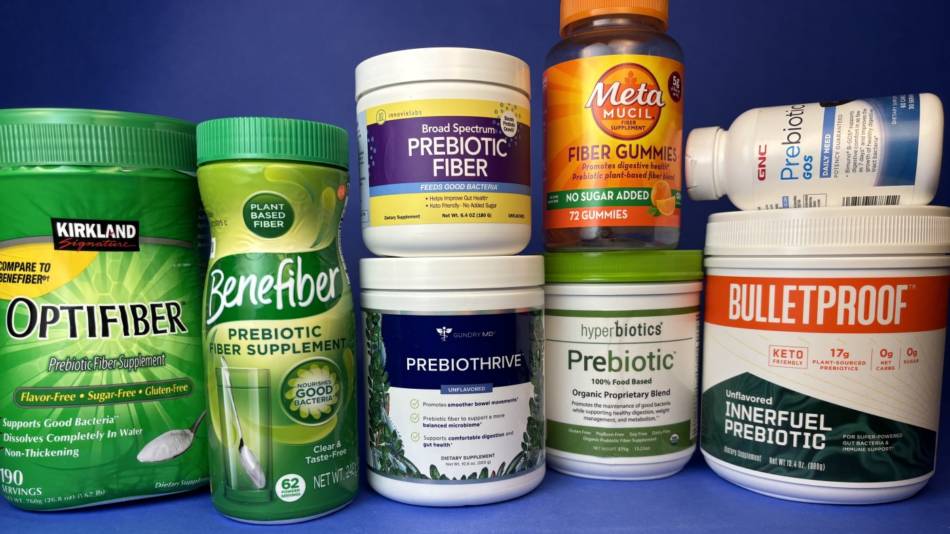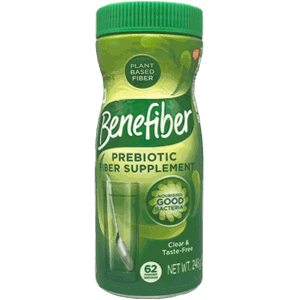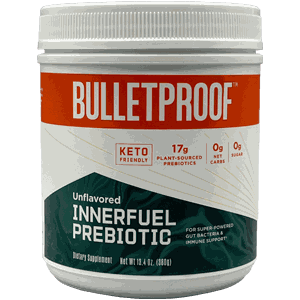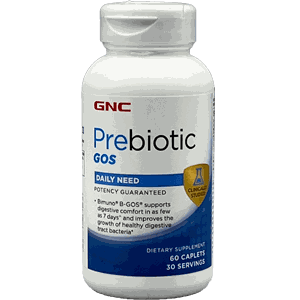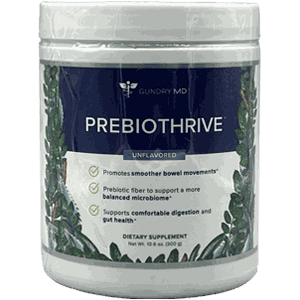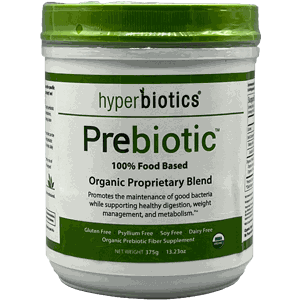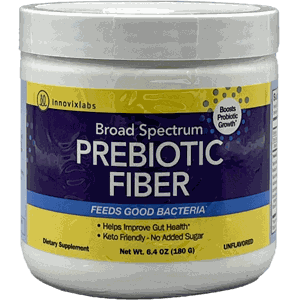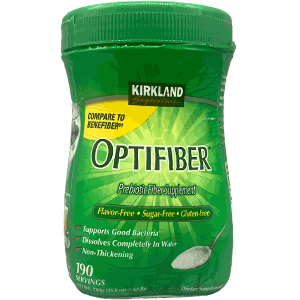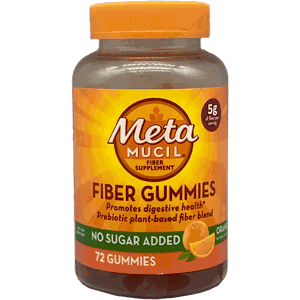Summary
-
What are prebiotics?
Prebiotic supplements provide soluble fiber that is fermentable and acts as food for microbes in the gut, which can turn it into other helpful compounds such as butyrate. There are a variety of sources of prebiotic fiber in supplements isolated from natural sources, such as chicory, acacia, larch, and guar, or synthesized to resemble natural prebiotic fiber. These prebiotic fibers include inulin (which contains fructooligosaccharides (also called FOS or fructans) and other prebiotic fibers), guar gum, and galactooligosaccharides (GOS) made from lactose from milk, and the semi-synthetic fibers: Partially hydrolyzed guar gum (PHGG), soluble corn fiber, and wheat dextrin. (See What It Is)
However, you can easily get prebiotic fiber from a wide variety of plant-based foods, including whole grains like oats and wheat, garlic, onions, and asparagus – which have the benefit of also providing forms of fiber that are nonsoluble and/or nonfermentable fiber and help with stool regularity.
Be aware that that not all soluble fiber is prebiotic fiber. The fiber found in psyllium is predominantly soluble but is nonfermentable and forms viscous gel which helps with laxation. Also, while the beta-glucans in oats and other grains are prebiotic, beta-glucans in mushrooms are less soluble and, likely, offer different benefits.
-
What are the health benefits of prebiotics?
Prebiotics may be beneficial in irritable bowel syndrome, constipation, blood sugar control, lowering cholesterol, and other conditions, although the evidence supporting some of these uses is mixed (see What It Does).
-
How much prebiotic should I take?
Clinical studies have used about 5 to 10 grams of prebiotic ingredient given once to three times per day, often starting with once daily to reduce initial gastrointestinal side effects (see What It Does).
-
What did ConsumerLab's tests of prebiotic supplements show?
Our tests showed that you often can't easily tell how much prebiotic fiber is actually in a prebiotic supplement. In fact, actual amount of prebiotic fiber in one product was only 26% of the listed amount of prebiotic ingredient. (See What CL Found)
We also found the cost to get a gram of prebiotic fiber from supplements to range from just 5 cents to 85 cents.
-
What is ConsumerLab's Top Pick among prebiotics?
Our two Top Picks among prebiotics passed our tests showing that they contained all or more of the prebiotic fiber that we expected at a clinically relevant dose and relatively low cost (see Top Picks).
-
Are there side-effects with prebiotics?
Prebiotics can initially cause gastrointestinal discomfort, gas and bloating. This can be an issue for some people with irritable bowel syndrome and/or those following a low FODMAP diet that, by definition, restricts prebiotic fiber. People with liver disease should be cautious in using prebiotics. (See Concerns & Cautions)
You must
be a member to get the full test results along with ConsumerLab.com recommendations and quality ratings. You will get results for six prebiotic supplements selected for testing by ConsumerLab.com, as well as two others that are included for having passed testing in its voluntary Quality Certification Program.
In this comprehensive review, you'll discover:
 Which prebiotic supplements failed our tests and which ones passed
Which prebiotic supplements failed our tests and which ones passed CL's Top Picks among prebiotic supplements
CL's Top Picks among prebiotic supplements Amounts of prebiotic fiber in each product -- something you can't easily tell from looking at labels
Amounts of prebiotic fiber in each product -- something you can't easily tell from looking at labels Price comparisons of prebiotic supplements
Price comparisons of prebiotic supplements
 Information about natural sources of prebiotics in supplements such as chicory, acacia, larch, and guar, and prebiotic fibers including inulin (which contains fructooligosaccharides (FOS) and other prebiotic fibers), guar gum, and galactooligosaccharides (GOS) made from lactose from milk
Information about natural sources of prebiotics in supplements such as chicory, acacia, larch, and guar, and prebiotic fibers including inulin (which contains fructooligosaccharides (FOS) and other prebiotic fibers), guar gum, and galactooligosaccharides (GOS) made from lactose from milk What prebiotics can and cannot do for conditions such as irritable bowel syndrome and constipation, as well as blood sugar control, lowering cholesterol
What prebiotics can and cannot do for conditions such as irritable bowel syndrome and constipation, as well as blood sugar control, lowering cholesterol How to get prebiotics from foods
How to get prebiotics from foods Concerns, cautions, and potential side effects of prebiotics
Concerns, cautions, and potential side effects of prebiotics
As a ConsumerLab.com member, you may print a copy of this report for your personal use.
You can access a special print version by clicking the "Print" icon in the upper right corner of this report.
You can then use your web browser's print functions to print the whole report or just selected pages.
You may also email or post a link to this report using the web address above.
Non-members using the link will see a free summary and can join to view the full report.
Other means of copying or distributing this report, in part or full, are not permitted.
If you are sight-impaired and your computer is having trouble converting the text in this report to speech,
contact us for assistance at Membership@ConsumerLab.com or by
phone at 914-722-9149.

